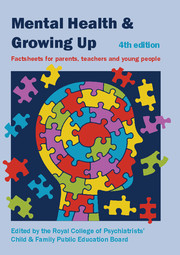Book contents
- Frontmatter
- Contents
- Contributors
- Factsheets for young people
- 1 Bipolar disorder
- 2 Cannabis and mental health
- 3 Cognitive–behavioural therapy (CBT)
- 4 Coping with stress
- 5 Depression
- 6 Drugs and alcohol
- 7 Exercise and mental health
- 8 Mental illness in a parent
- 9 Obsessive–compulsive disorder (OCD)
- 10 Psychosis
- 11 Schizophrenia
- 12 When bad things happen – overcoming adversity and developing resilience
- 13 Worries about weight and eating problems
- 14 Worries and anxieties
- 15 Who's who in child and adolescent mental health services (CAMHS)
- Factsheets for parents, carers and anyone who works with young people
10 - Psychosis
from Factsheets for young people
Published online by Cambridge University Press: 02 January 2018
- Frontmatter
- Contents
- Contributors
- Factsheets for young people
- 1 Bipolar disorder
- 2 Cannabis and mental health
- 3 Cognitive–behavioural therapy (CBT)
- 4 Coping with stress
- 5 Depression
- 6 Drugs and alcohol
- 7 Exercise and mental health
- 8 Mental illness in a parent
- 9 Obsessive–compulsive disorder (OCD)
- 10 Psychosis
- 11 Schizophrenia
- 12 When bad things happen – overcoming adversity and developing resilience
- 13 Worries about weight and eating problems
- 14 Worries and anxieties
- 15 Who's who in child and adolescent mental health services (CAMHS)
- Factsheets for parents, carers and anyone who works with young people
Summary
How do I know if I have psychosis?
When you have psychosis, you will often have very unusual and sometimes unpleasant thoughts and experiences. They may appear suddenly making you feel really frightened. They can also creep in so gradually that others, for instance your close family and friends, notice you are behaving strangely before you know it yourself. You may experience one or more of the symptoms described below.
• Unusual beliefs called ‘delusions ’ These are very strong beliefs which are obviously untrue to others, but not to you. For example, when you are ill, you may think that there is a plot to harm you or that you are being spied on by the TV or being taken over by aliens. Sometimes you may feel you have special powers.
• Thought disorder This is when you cannot think straight. Your ideas may seem jumbled, but it is more than being muddled or confused. Other people will find it very difficult to follow what you say.
• Unusual experiences called ‘hallucinations ’ These are when you can see, hear, smell or feel something that isn't really there. The most common hallucination that people have is hearing voices. Hallucinations are very real to the person having them. This can be very frightening and can make you believe that you are being watched or picked on.
Having these strange thoughts and experiences can affect you at school, at home or when you are with friends. You may find it difficult to concentrate and enjoy your usual activities. They can even affect your sleep and appetite.
How common is it?
Psychosis affects people of all ages, but is rare before you reach the older teenage years.
What causes psychosis?
When you have a psychotic episode, it can be a sign of another underlying illness. You can have a psychotic episode after a stressful event such as losing a close friend or relative. It can also be the result of a physical illness (e.g. a severe infection), the use of illegal drugs (e.g. cannabis) or a severe mental illness (e.g. schizophrenia or bipolar disorder).
Sometimes, especially the first time you experience the illness, it is difficult to know what has caused it.
- Type
- Chapter
- Information
- Mental Health and Growing UpFactsheets for Parents, Teachers and Young People, pp. 29 - 31Publisher: Royal College of PsychiatristsPrint publication year: 2013



